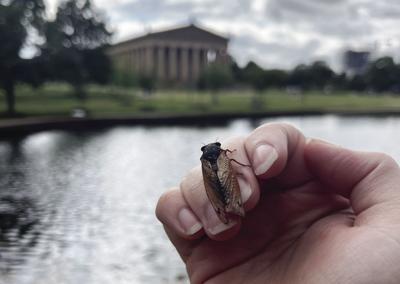
River James Witherow with a cicada on their hand in Centennial Park
Vodka Yonic features a rotating cast of women, nonbinary and gender-diverse writers from around the world sharing stories that are alternately humorous, sobering, intellectual, erotic, religious or painfully personal. You never know what you’ll find in this column, but we hope this potent mix of stories encourages conversation.
“They have letters on their wings.”
I don’t remember who first told me this fact about periodical cicadas, whether it was a sibling or a classmate or one of those anonymous children I met on the bleachers at my brothers’ tee-ball games. But upon scooping one of the squeaky bugs into my 7-year-old hands, I saw it was true. At the edge of many cicadas’ wings, the thin veins stand out like inked black letters. It’s pretty much just W’s and M’s, but I always searched for a K anyway. At the time, that was the first letter of my name. I had no idea that one day I’d have a different name, a different letter to search for.
Little me did know the 13-year cicada, Magicicada tredecim, was as magical as its taxonomy suggested. At 7, my favorite activities were playing Nintendo 64, catching bugs and pretending my bike could turn into a magical dolphin. It was, of course, 1998. Cicadas were ideal for afternoons of bug-catching. They weren’t as fast as grasshoppers or as delicate as butterflies. They didn’t bite or sting. And those secret messages on their wings made it feel like I was supposed to catch them. Every afternoon was like an Easter egg hunt, but weirder.
When the cicadas returned in 2011, I was in college studying art. I visited home, and the shells were so thick at the base of my grandmother’s trees that I could scoop them off the ground like a kid filling a bag with peach rings at Candy Craze. By this time, humanity had invented high-speed internet and Wikipedia, and my cache of cicada facts grew exponentially.
I learned that cicadas emerge en masse because their sole defense strategy is something called “predator satiation.” All the attributes that make them easy for a 7-year-old to catch also make them easy prey. Their only hope of survival is coming out in such massive numbers that the birds of the world can’t possibly eat them all. I learned that they spend more than a decade living underground, waiting for that one magical chance to emerge. Just imagine spending your whole life waiting, not knowing if you’re going to spread your wings and sing, or if someone’s goldendoodle will eat you just to throw you back up on the sidewalk.
I started drawing them for class, letting them swarm out of my pencils by the dozen, until they covered the walls of my studio the same way they’d covered the trees of my grandmother’s yard. In those days I had the overwhelming feeling that I’d also spent my life underground, that I was only now crawling out, but I had no idea what it was I was destined to morph into. I’d seen the 2011 cicadas newly emerged from their shells, their bodies still white and vulnerable, their still-drying wings as delicate as lace. Like me, their new wings were blank, their letters not yet revealed.
It’s now 2024, another lifetime removed from playgrounds and dorm rooms. Between the last emergence and this year’s, I came out as transgender. With that revelation also came the ultimate payoff for my lifetime of loving cicadas, because they’re an almost comically perfect metaphor for my queer experience.
Like many queer people, I felt like I’d spent the majority of my life hiding in the dark, buried alive. When it was finally time to emerge, to shed my shell and become myself, it was a struggle. There were days it felt impossible to pull myself apart and put the pieces back in order.
Nature has never pretended to be easy or fair, and not all molts are made equal. My fence is littered with the bodies of cicadas half-emerged from their shells — the ones that tried so hard to hatch, only to die before they were ever truly free. Many cicadas hatch with malformed wings, unable to fly. Some emerge in the wrong year — too early, too late — and find themselves alone.
Some days I look at myself in the mirror, cataloging my own imperfect metamorphosis. I think, If I’d only transitioned earlier, had puberty blockers, had a better surgeon. But even on my worst days, I still wouldn’t trade my transition for the world. Even a cicada without wings has seen a sun its younger self could only imagine. It’s a triumph just to survive in a body you’ve built for yourself.
Not everyone sees the beauty in these transformations. Many people are disgusted by the cicada emergence, by queer joy.
“They’re so gross.”
“They’re so loud, it’s annoying.”
“I just don’t want them near me.”
“God, they’re just everywhere all of a sudden.”
Different teeth, same bite. There are always predators waiting to eat us alive. Fragments of sparkling amber wings littering the ground. Another newspaper headline every day. But they can’t eat all of us, no matter how hard they try. We are not as defenseless as M. tredecim, but we are just as tenacious.
This year I’m looking for R’s on the wings, the first letter of the name I gave myself. I am, scientifically, unlikely to find an R, but I didn’t make it this far by giving up on impossible things.
I don’t know who I will be the next time Brood XIX emerges, but I know whoever I am, I will welcome that next emergence with joy.
Meeting this year’s Pride Parade grand marshals, highlighting the best of the Nashville Pride Festival and more






